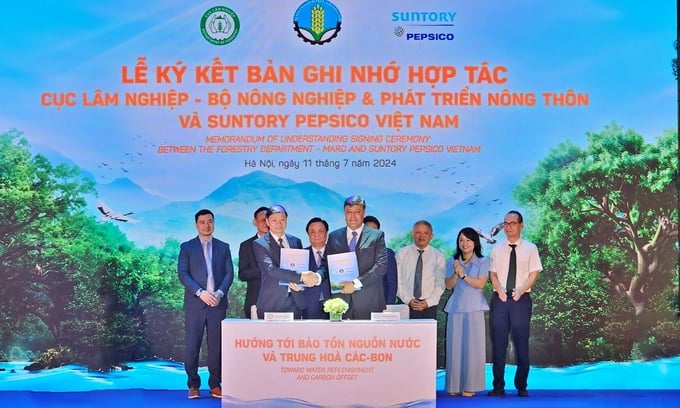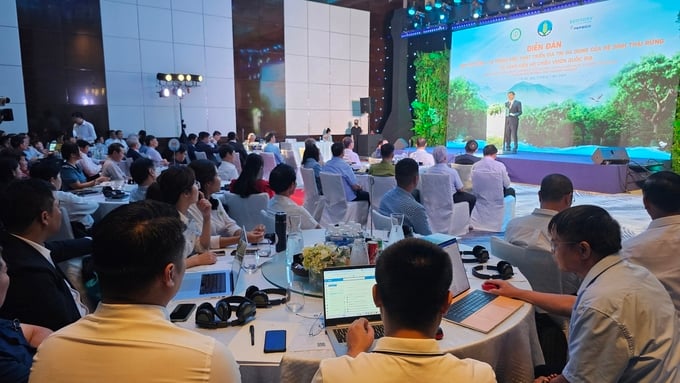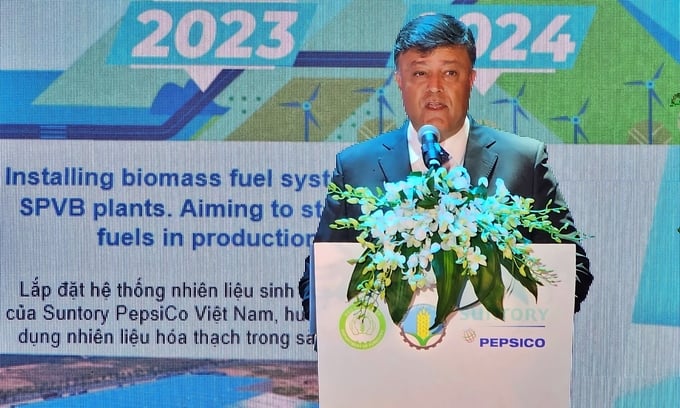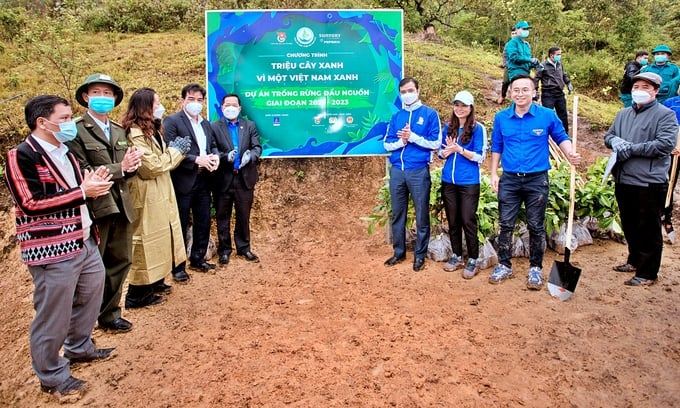May 31, 2025 | 20:12 GMT +7
May 31, 2025 | 20:12 GMT +7
Hotline: 0913.378.918
May 31, 2025 | 20:12 GMT +7
Hotline: 0913.378.918

Representatives from the Department of Forestry and Suntory PepsiCo Vietnam signing a memorandum of understanding. Photo: Bao Thang.
During his opening remarks at the signing ceremony, General Director of the Department of Forestry Tran Quang Bao stated that Vietnam's Forestry Development Strategy for the years between 2021 and 2030, with a vision towards 2050, called for the establishment of: "... appropriate mechanisms and policies to support, facilitate, and encourage investments into forestry development."
"The vision and objectives shared by both parties in terms sustainable development and stable livelihoods for local communities, along with mutual support and promotion, have prompted us to sign these agreements," Bao said.
Accordingly, the Department of Forestry and Suntory PepsiCo Vietnam committed to three main areas of cooperation: planting large timber forests; planting indigenous trees in combination with medicinal plants to improve local livelihoods and enhance carbon sequestration, neutrality; protecting the environment and restoring water resources.
The program aims to plant and enrich nearly 250 hectares of forest area, including upstream and protection forests nationwide. Additionally, it will design and implement the "Forestry Semester" program, which focuses on providing forest experiences to educate students, visitors on water resources, biodiversity, and fostering a love for forests.
Notably, the program will pilot the "National Park Passport" initiative. This initiative aims to encourage local residents and visitors to explore and experience forests, thereby fostering awareness regarding forest protection and development to enhance the multifaceted value of forests.

General Director Tran Quang Bao emphasized the concept of national park passports durng his opening remarks. Photo: Bao Thang.
This marks Vietnam's first attempt at implementing this initiative, with the objective of incentivizing visitors to experience and explore the values of forest ecosystems; gradually establishing a sustainable financial mechanism; and promoting the development of national parks and nature reserves with a focus on tourism infrastructure and attracting community interest.
During the early stages of the implementation process, the "National Park Passports" program will be applicable in 34 national parks. Domestic and international visitors can obtain the passport in either paper form or as an electronic passport. Additionally, passport holders will be eligible for various incentives and rewards, including a trip to Son Doong Cave as a special prize for visiting all 34 of Vietnam's national parks in less than five years.
Regarding the multifaceted value of forests, Deputy Director of the Department of Forestry Pham Hong Luong, highlighted four fundamental values: provisioning value (food, raw materials, clean water), regulating value (climate, air quality, erosion control, carbon absorption), supporting value (promoting plant photosynthesis, nutrient cycling of organisms), and cultural value (ecotourism, recreation, education, health care, aesthetics).
With a forest coverage rate of over 42%, which is higher than the global average of 31%, and over 10 million hectares of natural forest, Vietnam possesses significant potential to utilize the aforementioned values, with an ecosystem regulation value of approximately 29 trillion VND, a carbon storage value of 14 to 18 trillion VND, and a forest environment value of 3.5 trillion VND.
Approximately one-third of the special-use forest area nationwide (equivalent to between 60 and 65 forests) has organized ecotourism activities, generating over 300 billion VND annually. These activities are also the primary strategy for special-use forests to maintain capital for the management, protection, and development of forests, given the substantial capital requirements for forest restoration, biodiversity conservation, development of forest environmental services, and forest product processing in the years between 2021 and 2030. This requirement is estimated at over 500 trillion VND.

CEO Jahanzeb Khan provided insights into his company's six pillars of sustainable development. Photo: Bao Thang.
According to General Director Tran Quang Bao, the forestry sector has actively promoted the socialization of forest development. As the demand for the multifaceted value of forest ecosystems grows, public-private partnership emerges a viable solution.
"Public-private partnership is a channel to supplement resources and optimize investment efficiency, which are essential to maintaining a balance between benefit and risk-sharing among parties. Together, we will diversify and enhance the quality of products by utilizing technological support, improving institutional frameworks, and enhancing the investment environment," General Director Bao explained.
Among the six solutions to maximize the multifaceted value of forest ecosystems, the General Director Bao emphasized the role of organizing product linkages along the value chain, particularly the partnership with Suntory PepsiCo Vietnam. "We acknowledge the positive contributions made by Suntory PepsiCo Vietnam to sustainable development programs. We expect this partnership to be a significant step forward for both parties," he added.
With the same perspective as General Director Bao, Jahanzeb Khan, CEO of Suntory PepsiCo Vietnam, noted that the company shares a common concern for water conservation and sustainable development.
"As a beverage company, water is crucial for our development. Protecting and conserving water resources is our primary concern," CEO Khan stated. He also acknowledged that during the company's early days in the Vietnamese market, creating a positive impact on water resources has remained as one of the six pillars of the company's sustainable development.
Notably, the company has piloted the "Mizuiku" initiative for water protection in Japan since 2004. Subsequently, the "Mizuiku - I Love Clean Water" program was expanded to Vietnam in 2015. Over the last ten years, the program has established approximately 100 clean water and sanitation facilities for participating schools.
In 2023, the program's materials were adopted as official primary school curriculum guides, with the aim of educating nearly 3.7 million students nationwide on the importance of water resources and corresponding protection measures.

Suntory PepsiCo Vietnam participating in the planting of 1 billion trees in upstream protection forests. Photo: PepsiCo Vietnam.
Suntory PepsiCo Vietnam aims to replenish 100% of the water used in its factories by 2050. Additionally, the company is committed to nurturing water sources and returning clean water to nature, with a focus on upstream areas.
Suntory PepsiCo Vietnam has partnered with the Ministry of Agriculture and Rural Development, specifically the Department of Forestry, to participate in the project to plant 1 billion trees since 2021. The project aims to contribute to improving carbon sequestration and improving local livelihoods.
With these activities, the company acknowledges that environmental issues pose significant challenges that require inter-sectoral cooperation, particularly in addressing global issues. "Public-private partnerships are a crucial initiative. We believe that our partnership with the Department of Forestry will allow both parties to foster a greener, more prosperous, and sustainable Vietnam," CEO Khan remarked.
Translated by Nguyen Hai Long

(VAN) Several scientists and farmers are experimenting with soil treatment in some key durian-growing regions such as Cai Lay (Tien Giang), Dak Song, Gia Nghia, and Dak R’lap (Dak Nong).
/2025/05/25/4127-3-073637_820.jpg)
(VAN) Thanks to the promotion from an FAO-implemented project, vegetable production in greenhouses in Moc Chau has seen strong development, from 1.5 hectares in 2021 to nearly 50 hectares in 2024.

(VAN) FAO has recently supported USD 140,000 to implement the project 'Risk mitigation human-animal interface risks through disease control initiatives in pig farming.'

(VAN) The People's Committee of Tra Vinh province has approved an adjustment to the investment policy for the Green Hydrogen Plant project, increasing its area to approximately 52.76 hectares.
![Reducing emissions from rice fields: [2] Farmers’ commitment to the soil](https://t.ex-cdn.com/nongnghiepmoitruong.vn/608w/files/news/2025/05/05/dsc08881jpg-nongnghiep-140632.jpg)
(VAN) Clean rice cultivation model in Thuong Tan commune, Bac Tan Uyen district, is assisting local residents in achieving sustainable agriculture by substantially reducing costs, increasing productivity, and protecting the environment.

(VAN) At the conference to disseminate Resolution No. 68, AgriS introduced its digital agricultural ecosystem and reaffirmed its commitment to accompanying the Government in promoting private sector development and sustainable agriculture.

(VAN) 'Blue Ocean - Blue Foods' initiative is designed to restore marine ecosystems and establish sustainable livelihoods for local communities by cultivating a minimum of 1,000 hectares of cottonii seaweed in the first three years.